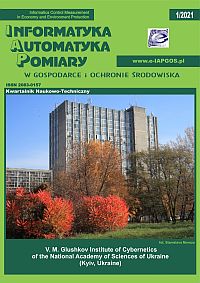TWORZENIE OPROGRAMOWANIA BEZ KODOWANIA NA PRZYKŁADZIE PLATFORMY LOGOTEC APP STUDIO
##plugins.themes.bootstrap3.article.sidebar##
Open full text
Numer Tom 11 Nr 1 (2021)
-
SYSTEM DO POMIARU ZESPOLONEJ PODATNOŚCI MAGNETYCZNEJ NANOCZĄSTEK Z WYKONANYM W TECHNOLOGII DRUKU 3D KARKASEM ZINTEGROWANYCH CEWEK ODBIORCZYCH
Mateusz Midura, Przemysław Wróblewski, Damian Wanta, Grzegorz Domański, Mateusz Stosio, Jacek Kryszyn, Waldemar T. Smolik4-9
-
METODY POMIARU SPRZĘŻENIA MAGNETOELEKTRYCZNEGO W MATERIAŁACH MULTIFERROICZNYCH
Jakub Grotel10-14
-
METODY WYKRYWANIA POŻARÓW W EKOSYSTEMACH PRZY UŻYCIU ZDJĘĆ SATELITARNYCH O NISKIEJ ROZDZIELCZOŚCI
Valerii Shvaiko, Olena Bandurka, Vadym Shpuryk, Yevhen V. Havrylko15-19
-
WYTWARZANIE ZAPÓR OGNIOWYCH REALIZOWANYCH POPRZEZ WYBUCHOWE WYTWARZANIE AEROZOLU WODNEGO JAKO ELEMENT INŻYNIERII BEZPIECZEŃSTWA POŻAROWEGO
Grzegorz Śmigielski20-23
-
METODY OCENY I PROGNOZOWANIA POZIOMÓW PROMIENIOWANIA ELEKTROMAGNETYCZNEGO W ŚRODOWISKACH MIEJSKICH
Denys Bakhtiiarov, Oleksandr Lavrynenko, Nataliia Lishchynovska, Ivan Basiuk, Tetiana Prykhodko24-27
-
METODA OKREŚLANIA RZECZYWISTEJ WARTOŚCI CIŚNIENIA W PRÓŻNIOWEJ KOMORZE GASZENIOWEJ SN
Michał Lech, Damian Kostyła28-31
-
PRZEGLĄD METOD SELEKCJI CECH UŻYWANYCH W DIAGNOSTYCE CZERNIAKA
Magdalena Michalska32-35
-
OPRACOWANIE METODY WYKORZYSTANIA SZTUCZNEJ INTELIGENCJI DO UZYSKIWANIA DOKŁADNIEJSZYCH WYNIKÓW PODSTAWOWYCH PARAMETRÓW PROPAGACJI SYGNAŁÓW RADIOWYCH
Andrii Shchepak, Volodimir Parkhomenko, Vyacheslav Parkhomenko36-39
-
ZASTOSOWANIE METODY ANALIZY WSPÓŁCZYNNIKA MACIERZOWEGO DO OKREŚLENIA PARAMETRÓW FUNKCJI CELU DLA MINIMALIZACJI RYZYKA W TRANSPORCIE
Serhii Zabolotnii, Sergii Mogilei40-43
-
ALGORYTMY BILANSOWANIA ORAZ HIERARCHIZACJI MACIERZY WEDŁUG ICH TYPU I ZŁOŻONOŚCI
Yuriy Khanas, Michał Borecki44-49
-
POLIPARAMETRYCZNE KODOWANIE BLOKOWE
Julia Milova, Yuri Melnik50-53
-
TWORZENIE OPROGRAMOWANIA BEZ KODOWANIA NA PRZYKŁADZIE PLATFORMY LOGOTEC APP STUDIO
Monika Moskal54-57
-
APLIKACJA SZKOLENIOWA OPARTA NA SCENARIUSZACH INTERAKCJI VR – NA PRZYKŁADACH DLA LOGISTYKI
Wojciech Włodyka, Dariusz Bober58-61
-
BADANIE ZALEŻNOŚCI STRUKTURY WEKTORÓW INDEKSÓW PRZESUNIĘCIA OD WŁAŚCIWOŚCI KODÓW PIERŚCIENIOWYCH W MOBILNYCH SIECIACH INTERNETU RZECZY
Vladislav Kravchenko, Olena Hryshchenko, Viktoriia Skrypnik, Hanna Dudarieva62-64
Archiwum
-
Tom 13 Nr 4
2023-12-20 24
-
Tom 13 Nr 3
2023-09-30 25
-
Tom 13 Nr 2
2023-06-30 14
-
Tom 13 Nr 1
2023-03-31 12
-
Tom 12 Nr 4
2022-12-30 16
-
Tom 12 Nr 3
2022-09-30 15
-
Tom 12 Nr 2
2022-06-30 16
-
Tom 12 Nr 1
2022-03-31 9
-
Tom 11 Nr 4
2021-12-20 15
-
Tom 11 Nr 3
2021-09-30 10
-
Tom 11 Nr 2
2021-06-30 11
-
Tom 11 Nr 1
2021-03-31 14
-
Tom 10 Nr 4
2020-12-20 16
-
Tom 10 Nr 3
2020-09-30 22
-
Tom 10 Nr 2
2020-06-30 16
-
Tom 10 Nr 1
2020-03-30 19
-
Tom 9 Nr 4
2019-12-16 20
-
Tom 9 Nr 3
2019-09-26 20
-
Tom 9 Nr 2
2019-06-21 16
-
Tom 9 Nr 1
2019-03-03 13
##plugins.themes.bootstrap3.article.main##
DOI
Authors
Abstrakt
Cyfryzacja to jeden z głównych trendów zmieniających społeczeństwo i funkcjonowanie przedsiębiorstw. Cyfryzacja obejmuje zakup oprogramowania pomagającego w automatyzacji procesów biznesowych. Uzyskanie przewagi konkurencyjnej jest możliwe poprzez wdrażanie dedykowanych (niestandardowych) rozwiązań informatycznych dostosowanych do specyfiki danego przedsiębiorstwa, jednakże ze względu na wysokie koszty pozostają one poza zasięgiem większości przedsiębiorstw. Technologia no-code – najnowszy trend w branży IT – jest rozwiązaniem tego problemu. W artykule zostały omówione przyczyny, dla których technologia no-code zyskuje na popularności. Przedstawiono również różnice między tradycyjnym podejściem do tworzenia rozwiązań IT, a podejściem no-code. Szczegółowy opis technologii no-code został oparty na badaniu platformy no-code o nazwie Logotec App Studio. W artykule podkreślono możliwości zastosowania narzędzi no-code w procesie cyfryzacji przedsiębiorstw.
Słowa kluczowe:
Bibliografia
Adrian B., Hinrichsen S., Nikolenko A.: App Development via Low-Code Programming as Part of Modern Industrial Engineering Education. Advances in Human Factors and Systems Interaction: Proceedings of the AHFE 2020 Virtual Conference on Human Factors and Systems Interaction. Springer Nature 2020, 45–54. DOI: https://doi.org/10.1007/978-3-030-51369-6_7
Bloomber J.: The Low-Code/No-Code Movement: More Disruptive Than You Realize. Forbes [https://www.forbes.com/sites/jasonbloomberg/2017/07/20/the-low-codeno-code-movement-more-disruptive-than-you-realize/#52be2098722a] (20 July 2017).
Brennen S., Kreiss D.: Digitalization and Digitization. [http://culturedigitally.org/2014/09/digitalization-and-digitization/] (8 September 2014).
Buxton J., Macro A.: The Craft of Software Engineering. Addison-Wesley, Wokingham 1987.
Ciot T.: What is a Low-Code/No-Code Platform? [https://devops.cioreview.com/cxoinsight/what-is-a-lowcodenocode-platform-nid-15249-cid-99.html] (17 November 2020).
Gartner Inc.: Gartner. [https://www.gartner.com/en/about].
Han J., Pei J., Kamber M.: Data Mining: Concepts and Techniques. Morgan Kaufmann Publishers Inc., Burlington 2011.
Henriette E., Mondher F., Boughzala I.: The Shape of Digital Transformation: A Systematic Literature Review. Ninth Mediterranean Conference on Information Systems (MCIS). Samos 2015.
Ince D. C.: Software Engineering. Van Nostrand Reinhold, London 1989.
Knuth D. E.: Algorithmic Thinking and Mathematical Thinking. The American Mathematical Monthly 92(3), 1985, 170–181. DOI: https://doi.org/10.1080/00029890.1985.11971572
Logotec Engineering S.A. [https://logotec.pl/].
Logotec Engineering S.A. [https://logotec.pl/pl/o-nas].
Molyneux P.: Declarative Programming. Managing with Information Technology. Springer, London 1993. DOI: https://doi.org/10.1007/978-1-4471-3299-8_1
OECD: Enterprises by business size. 2021 [http://doi.org/10.1787/31d5eeaf-en]. DOI: https://doi.org/10.1787/31d5eeaf-en
Parviainen P., Tihinen M., Kääriäinen J., Teppola S.: Tackling the digitalization challenge: how to benefit from digitalization in practice. International Journal of Information Systems and Project Management V(1), 2017, 63–77. DOI: https://doi.org/10.12821/ijispm050104
Sommerville I.: Software Engineering. Addison-Wesley, Wokingham 1989.
Stolterman E., Fors A. C.: Information Technology and the Good Life. Information Systems Research: Relevant Theory and Informed Practice. Kluwer Academic Publishers, London 2004. DOI: https://doi.org/10.1007/1-4020-8095-6_45
Vincent P., Iijima K., Driver M., Wong J., Natis Y.: Gartner Magic Quadrant for Enterprise Low-Code Application Platforms. [https://www.gartner.com/en/documents/3956079/magic-quadrant-for-enterprise-low-code-application-platf].
##plugins.themes.bootstrap3.article.details##
Abstract views: 2666
Licencja

Utwór dostępny jest na licencji Creative Commons Uznanie autorstwa – Na tych samych warunkach 4.0 Miedzynarodowe.






